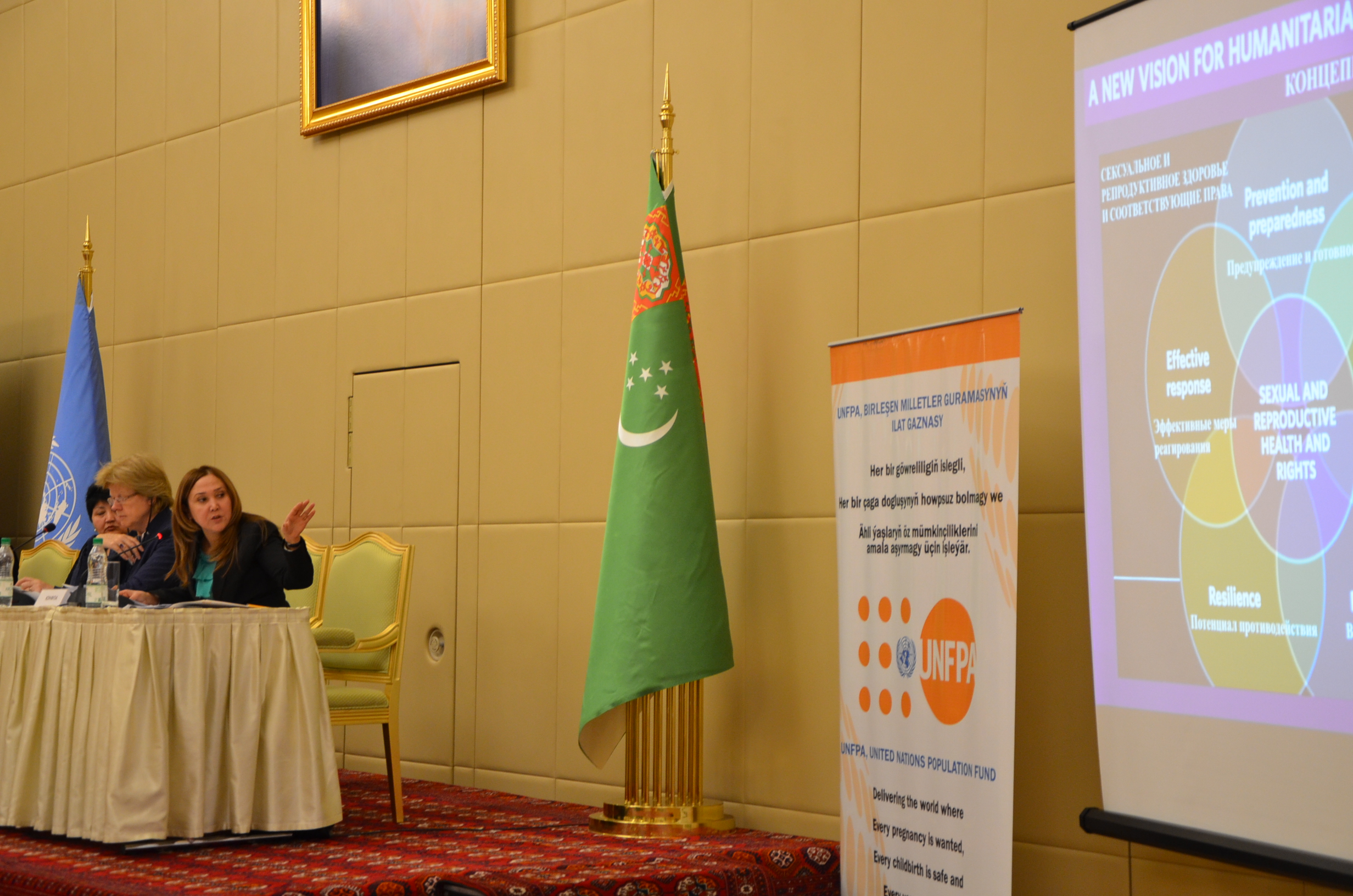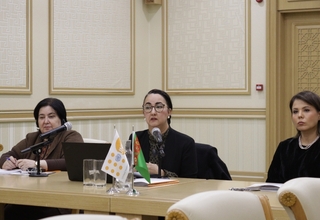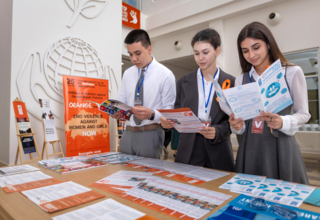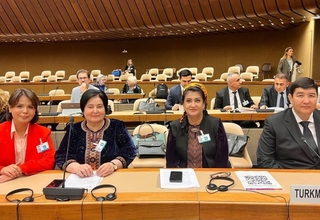The State of World Population (SWOP) 2015 Report titled “Shelter from the storm: A transformative agenda for women and girls in a crisis-prone world” was launched in Ashgabat on 7th of December at the Yyldyz Hotel.
The Report was presented at the ceremony, which was attended by the Turkmen national partners, university professors and students, as well as the civil society and national mass media. The report was also launched globally in more than 100 countries. During the launch in Ashgabat, Ms. Jacinta Barrins, UN Resident Coordinator and UNFPA Representative, congratulated the Government of Turkmenistan, partners and guests with the 20 year anniversary of the UN General Assembly recognizing Turkmenistan’s status of permanent neutrality.
More than 100 million people globally were in need of humanitarian assistance in 2015, up from 88 million in 2014 and 78 million in 2013. About a quarter of them are women and adolescent girls of childbearing age—between 15 and 49. Pregnancy and childbirth kill 507 women every day in these settings. Sexual and reproductive health services critical to the health and survival of women and adolescents are scarcest at the time they are needed most, the State of World Population report says.
“Three fifths of maternal deaths today occur in countries that are considered fragile because of conflict or disaster”, said Ms. Jacinta Barrins “reproductive health of women and children cannot be neglected or made secondary anymore.”
Many countries in Central Asia and the South Caucasus, as well as Turkey, are prone to climate change risks, especially earthquakes. The largest-scale emergency currently affecting the region is the refugee crisis created by the on-going violence in Syria, which has driven more than 4 million people out of that country. Turkmenistan is one of the key humanitarian and environmental actors in the region vulnerable to emergencies sparked by conflicts both within the region itself and in neighbouring countries, and to those created by natural disasters. The country recently joined the Sendai Framework of Action at the III World Conference on Disaster Reduction and organized the Regional ministerial conference on prevention and response to emergencies and natural disasters.
“There is an urgency in the world for the transformative agenda to connect development and humanitarian programmes”, stated Ms. Bayramgul Garabayeva, UNFPA Assistant Representative, “prevention and preparedness are necessary and empowerment is the key to delivering essential enabling environment and responsive mechanisms based on reliable data.” UNFPA and Turkmenistan marked its 3rd cycle of cooperation, which contributed significantly to strengthening systems of population data collection and analysis across sectors, introducing National Plan of Action on Gender Equality, adopting and implementing 31 protocols and vision papers on maternal and newborn health, particularly for women and adolescent’s reproductive health.
In 2014 Turkmenistan has adopted Minimum Initial Services Package plan. Currently it is being included into National health plan and respectively to the National plan on preparedness and response to emergencies to ensure mainstreaming of its indicators across all sectors. “Ministry of Health and Medical Industry (MoHMI) of Turkmenistan works towards implementing this critical plan to guarantee that the sexual and reproductive health of women and young people is effectively integrated in preparedness and contingency plans”, stated Ms. Bahar Agayeva, Head of Medical Statistics Department of MoHMI, “We have already trained 74 national specialists around the country, specifically in the areas bordering Afghanistan”
“For us it is a priority that motherhood, pregnancy and childbirth is always safe, including in situations of natural disasters and humanitarian crises as women continue getting pregnant and having babies when emergency happens”, said Dr. Gul Murrykova, Head of Clinical Diagnostics Department of Mother and Child Hospital. MISP ensures humanitarian responses that go far beyond the provision of food and shelter, as essential as those things are, and include reproductive health and family planning services.
Because the demand for humanitarian assistance outpaces supply, a new approach is needed, with a new emphasis on prevention, preparedness and building resilience of nations, communities, institutions and individuals. Building resilience requires equitable, inclusive development that protects rights, including the right to sexual and reproductive health, the report concludes.
“The business-as-usual approach to humanitarian assistance will leave too many behind at a time when needs are so great,” Dr. Osotimehin, UNFPA Executive Director says. “We need to do a much better job of helping the most vulnerable, especially adolescent girls. But we must also do a much better job of investing in a more stable world, capable of withstanding the storms ahead.”
For the full SWOP 2015 Report and other resources in English and Russian languages, please visit: http://www.unfpa.org/swop
UNFPA: Delivering a world where every pregnancy is wanted, every childbirth is safe, and every young person’s potential is fulfilled.
***
For additional information, please contact:
Tel: +99312425250
Web: unfpa.org.tm, www.untuk.org





